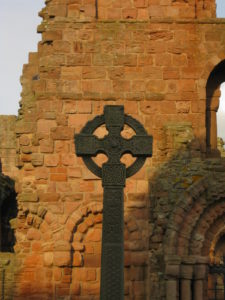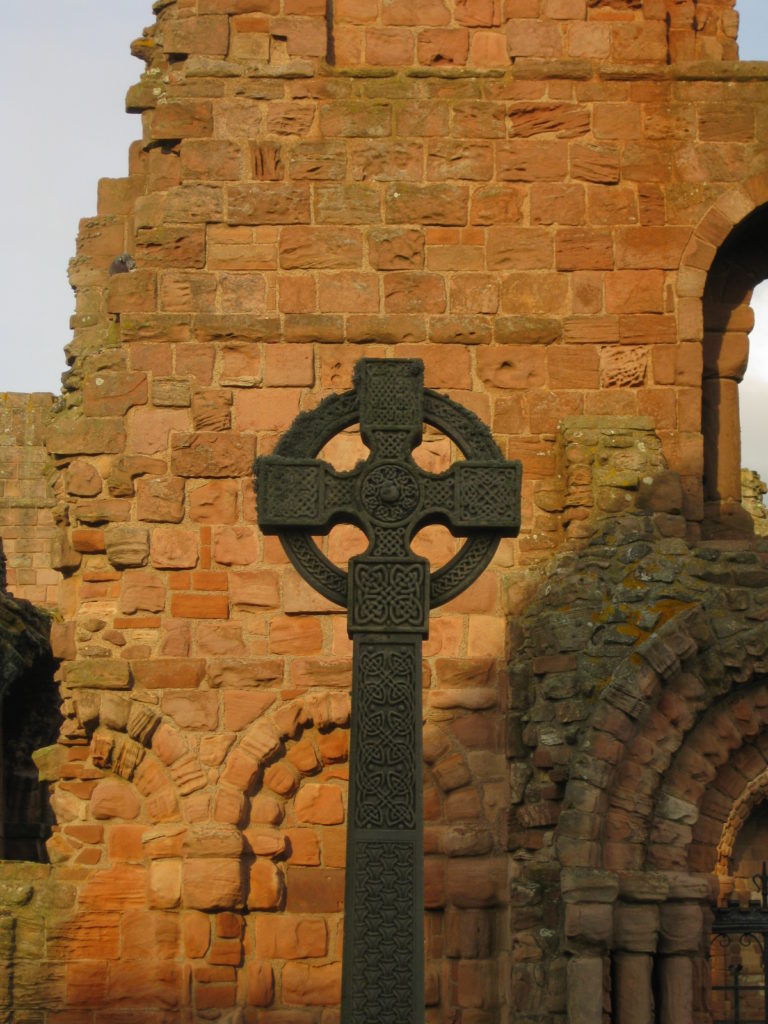How to start explaining what a Celtic expression of Christian faith has to say to the Fresh Expressions movement? Why, with a story, of course.
Oswald was a member of the Saxon royal family of Northumbria, a 7th-century kingdom covering a large part of northern England and southern Scotland. His uncle seized the throne, when Oswald was a boy. Orphaned and in danger, Oswald fled for his life. He found safety in the island monastery of Iona. There he was converted and baptized. He promised God that, if he re gained the throne, he would send to Iona for a mission team to bring Christ to his people. And so it happened. Iona sent a team led by a monk named Corman, but it was a total failure. He returned to Iona, and reported: “These people are too wild and uneducated to accept the gospel.” Aidan famously replied, “It seems to me, brother, that you should have fed them the milk of the word, rather than the meat, and walked a while in their shoes.” The monks saw that Aidan understood, in the 20th-century words of David Bosch, that “The Christian faith never exists except as ‘translated’ into a culture.” They sent Aidan with a team of about 12 monks. This time, there was great success. Aidan and his followers were largely responsible for the evangelization of (what is now)England.
gained the throne, he would send to Iona for a mission team to bring Christ to his people. And so it happened. Iona sent a team led by a monk named Corman, but it was a total failure. He returned to Iona, and reported: “These people are too wild and uneducated to accept the gospel.” Aidan famously replied, “It seems to me, brother, that you should have fed them the milk of the word, rather than the meat, and walked a while in their shoes.” The monks saw that Aidan understood, in the 20th-century words of David Bosch, that “The Christian faith never exists except as ‘translated’ into a culture.” They sent Aidan with a team of about 12 monks. This time, there was great success. Aidan and his followers were largely responsible for the evangelization of (what is now)England.
There are several morals to this story, which I can only touch on here. Think them through as regards your situation. TheIonateam faced people with a totally different language, belief system and culture. It is less obvious, but I believe true, that most churches now face cross-cultural mission in this country. People of my generation realize it when we listen to the under-40s.
- First, the team went with royal support, at royal invitation. The welcome, love and quality of life of the Ionacommunity won the young Oswald for Christ, and opened the door wide for evangelism. How can your love similarly earn you the right to be heard?
- Oswald and his people were Saxons; Aidan and his team, Irish Celts. They were willing to immerse themselves in their hosts’ language and culture, and present their message in a culturally sensitive way. Paul did the same with the tough crowd he met atAthens (Ac 17:16ff).
- The life of the team gave flesh to the message – that is, they ‘incarnated’ it. The island of Lindisfarne became their home base, a place of education and prayer, rest and equipping. Its life embodied Christ, and small teams of monks took that love with them as they went to heal, preach, serve and love the people of the land. You could say it was Acts 2:42-47 all over again.
- Coupled with that point is this: they brought a complete message of the Kingdom. They served the poor, and came to be loved by them – much as the rural pastor Gannon Sims described in his recent blog ‘Building Bridges’ on this site. They did so with integrity, out of Christ-like love, not just to ‘soften them up’ for evangelization.
- They spoke truth to power. Aidan was not afraid to call the king to account if necessary.
- They demonstrated the power of the Spirit in healing and other ways. Echoes of Paul again: read 1 Cor. 2:1-5.
- Their life was committed, united and in balance. Money raised went to the poor, or to buy slaves their freedom. Prayer was a vital part of the rhythm of each day. They balanced times of prayer and mission; work and rest; study and sharing; solitude and community.
Lindisfarne is a tidal island: for about 7 hours on each tide you can walk or drive to the mainland, then for 5 hours you are cut off. It is a symbol to the vowed Community to which I belong that reminds us to maintain such a rhythm.
All of this meant that their evangelism was an invitation to join the pilgrim community. Community life was strong, yes, but the edges were wide open in hospitality and welcome. Thus they allowed people to belong first, and then believe; and they were able to make disciples, not just converts. John Wesley and Billy Graham, to name but two examples, would not preach anywhere unless they knew any converts would be welcomed and discipled. Aidan and his team would agree with that need.
In thus proclaiming the Kingdom, the early Celtic Christians had a vision not just of a redeemed church, but, in the shining words of Esther de Waal, a world made whole. Their communities, at their best, were ‘colonies of heaven,’ or ‘villages of God’ (to quote Ian Bradley and Ray Simpson, in that order). They were joining in God’s work, as seen in Jesus’ life and mission. To quote de Waal: “God is at work making his world whole…. a world in which the divides go down and the barriers are crossed, becomes a world which integrates and heals…. The barriers between this world and the next simply fall away naturally.”
Paul Martin serves as Guardian of the Community of Aidan and Hilda in the US. He lives in Cannon Falls, Minnesota. The Community of Aidan and Hilda is a sponsor of the Fresh Expressions US National Gathering where Martin will lead a workshop on the Celtic way of mission.

